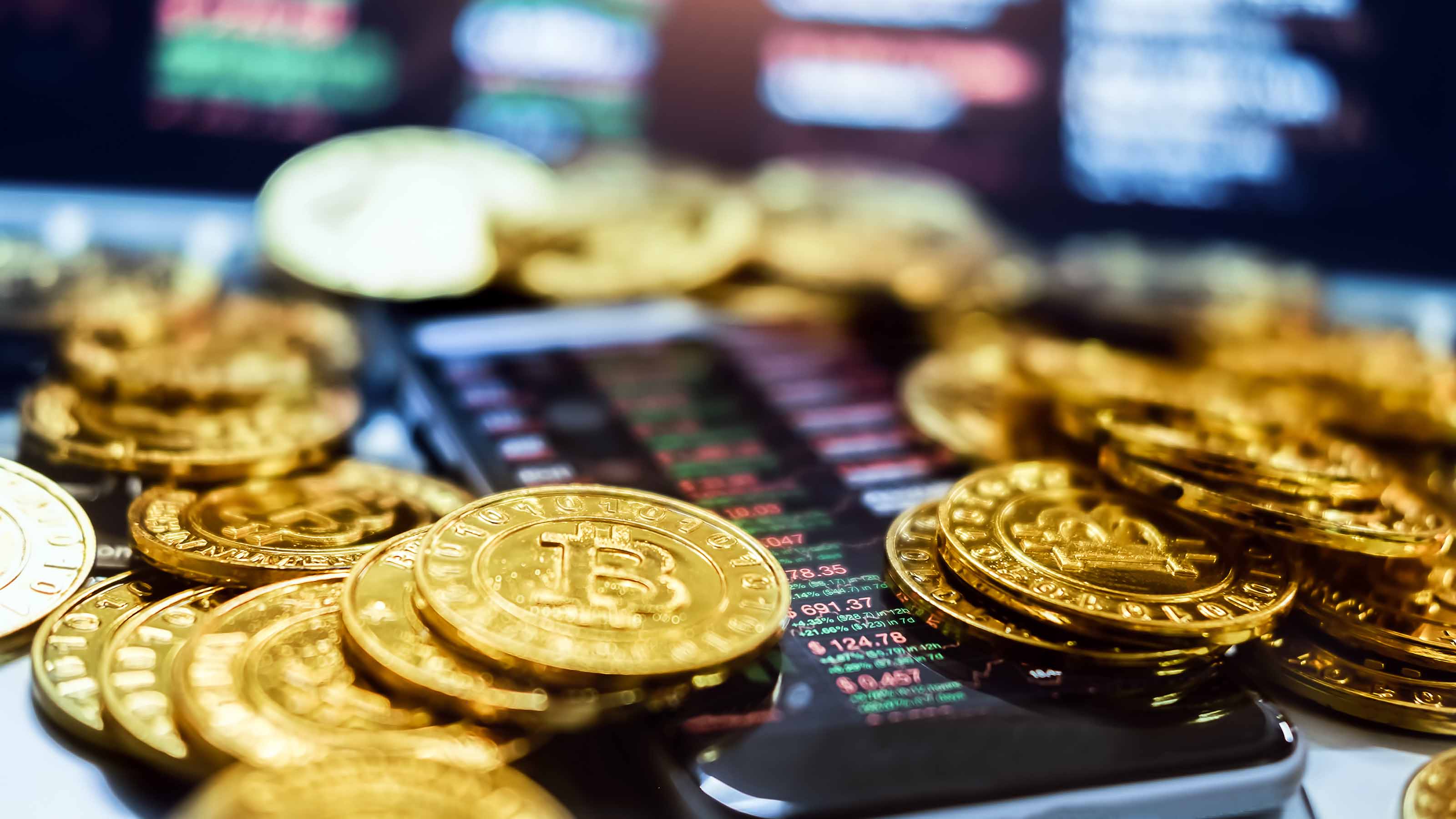Coinbase Brings Another Cryptocurrency Risk to Light
Coinbase Global CEO tries to calm users after a recent filing said they could lose access to their cryptocurrencies if the company entered bankruptcy proceedings.

Profit and prosper with the best of Kiplinger's advice on investing, taxes, retirement, personal finance and much more. Delivered daily. Enter your email in the box and click Sign Me Up.
You are now subscribed
Your newsletter sign-up was successful
Want to add more newsletters?

Delivered daily
Kiplinger Today
Profit and prosper with the best of Kiplinger's advice on investing, taxes, retirement, personal finance and much more delivered daily. Smart money moves start here.

Sent five days a week
Kiplinger A Step Ahead
Get practical help to make better financial decisions in your everyday life, from spending to savings on top deals.

Delivered daily
Kiplinger Closing Bell
Get today's biggest financial and investing headlines delivered to your inbox every day the U.S. stock market is open.

Sent twice a week
Kiplinger Adviser Intel
Financial pros across the country share best practices and fresh tactics to preserve and grow your wealth.

Delivered weekly
Kiplinger Tax Tips
Trim your federal and state tax bills with practical tax-planning and tax-cutting strategies.

Sent twice a week
Kiplinger Retirement Tips
Your twice-a-week guide to planning and enjoying a financially secure and richly rewarding retirement

Sent bimonthly.
Kiplinger Adviser Angle
Insights for advisers, wealth managers and other financial professionals.

Sent twice a week
Kiplinger Investing Weekly
Your twice-a-week roundup of promising stocks, funds, companies and industries you should consider, ones you should avoid, and why.

Sent weekly for six weeks
Kiplinger Invest for Retirement
Your step-by-step six-part series on how to invest for retirement, from devising a successful strategy to exactly which investments to choose.
A precipitous plunge in Coinbase Global (COIN, $72.99) stock is suddenly more than just a concern to current shareholders. That's because the cryptocurrency exchange operator just warned its users that, in the event of a bankruptcy, the company might just hold on to their digital assets.
Typically, the most important news to come out of a publicly traded company's quarterly earnings report is … well, the earnings. Analysts, media and investors all flock to see how the company's most recent sales, profits and other performance metrics stacked up, and when available, what the company projects it will do going forward.
But in Coinbase's report, released Tuesday after the market close, the biggest news nugget was tucked away in a lesser-viewed section: "Risk factors."
From just $107.88 $24.99 for Kiplinger Personal Finance
Become a smarter, better informed investor. Subscribe from just $107.88 $24.99, plus get up to 4 Special Issues

Sign up for Kiplinger’s Free Newsletters
Profit and prosper with the best of expert advice on investing, taxes, retirement, personal finance and more - straight to your e-mail.
Profit and prosper with the best of expert advice - straight to your e-mail.
Public companies must regularly disclose extensive amounts of information related to their business to aid investors in understanding the full risks involved with their investments. And in their Q1 2022 filing, a new SEC requirement called SAB 121 obligated the company to detail responsibilities to safeguard crypto assets held for users on the trading platform. The disclosure stated that, in the event Coinbase ever declared bankruptcy, "the crypto assets we hold in custody on behalf of our customers could be subject to bankruptcy proceedings" and Coinbase users would become "general unsecured creditors".
Coinbase CEO Brian Armstrong insists Coinbase isn't at risk of bankruptcy.
"There is some noise about a disclosure we made in our 10Q today about how we hold crypto assets," he tweeted. "Tl;dr: Your funds are safe at Coinbase, just as they’ve always been."
But amid a weak quarterly performance and a recent collapse in crypto prices – not to mention shares that had crumpled by 25% late Wednesday and, as of late in the session, were down more than 85% from the company's $381 initial public offering (IPO) price – Coinbase users wouldn't be blamed for wondering what exactly this new risk factor means for them.
And for that matter, users of any platform that facilitates crypto trading might want to learn a little more about this situation.
What Happened?
Coinbase on Tuesday reported a pretty disappointing quarter on most fronts. First-quarter revenues were off 27% year-over-year to $1.17 billion, widely missing analysts' expectations for $1.50 billion. Meanwhile, the company swung to a $430 million loss after earning $388 million in the year-ago period, and monthly users were down 19% YoY.
But investors were more drawn to an SEC disclosure related to what would happen to user cryptocurrency assets in the worst-case event of a future bankruptcy proceeding:
"Because custodially held crypto assets may be considered to be the property of a bankruptcy estate, in the event of a bankruptcy, the crypto assets we hold in custody on behalf of our customers could be subject to bankruptcy proceedings and such customers could be treated as our general unsecured creditors," the company said in its Form 10-Q.
What Does That Mean for Coinbase Users (And Their Crypto)?
This effectively means Coinbase users' ownership of their crypto isn't absolute. In the event of a Coinbase bankruptcy, any crypto held on the exchange becomes subject to bankruptcy proceedings, potentially taking away users' cryptocurrency assets.
Such an event wouldn't happen with a crypto wallet that carries a private key, or a long string of characters that acts as a password. Without this private key, the crypto becomes inaccessible.
When users create a Coinbase account, they actually hold their crypto in a wallet controlled by Coinbase. Users agree to have Coinbase hold the private key; instead, users gain access to the wallet with a typical password. In doing so, Coinbase users give up partial control over their cryptocurrency assets. In the event of a bankruptcy, that means Coinbase has to hand over the keys, so to speak, to debtors.
Receiving treatment as a general unsecured creditor during a bankruptcy proceeding would mean Coinbase users wouldn't have the right to claim any specific property from the exchange during the proceedings. Further, they'd be locked from accessing their funds held on the platform. When companies proceed to liquidation during a bankruptcy proceeding, all of its assets get distributed to its creditors. First in line to claim assets they are owed are secured creditors, followed by unsecured creditors. General unsecured creditors sit behind secured creditors but ahead of common stockholders.
While the potential for being treated as a general unsecured creditor is bad enough, the company also states the new language may lead customers to believe holding cryptocurrency with the platform would be "more risky," potentially impacting the company's financial position further.
Investors should note that none of this reflects a sudden change in policy.
"The Coinbase comments regarding the potential loss to customers if the company ever filed for bankruptcy is not really new information more than it is the public just starting to understand the ramifications of trading in this unregulated industry," says Rance Masheck, CEO of stock research platform iVest+.
What About SIPC, You Say?
Traditional brokerages carry Securities Investor Protection Corporation (SIPC) coverage worth a total of $500,000, of which $250,000 is coverage for cash and the remainder for securities held in your brokerage account. Securities, in this context, imply financial assets like stocks and bonds.
At this time, however, crypto isn't considered a security, meaning crypto holdings don't carry such coverage.
If Coinbase offered only trading of covered securities, Coinbase users would have SIPC coverage to protect against the loss of cash or securities due to financial troubles from the exchange.
Regardless, Armstrong believes Coinbase customers are safe.
"We believe our Prime and Custody customers have strong legal protections in their terms of service that protects their assets, even in a black swan event like this," he says. "This disclosure makes sense that these legal protections have not been tested in court for crypto assets specifically."
Wall Street Still High on Coinbase Global
While several Wall Street analysts spent Wednesday lowering their expectations for COIN stock, the pros are broadly still constructive on the crypto exchange operator's shares. According to S&P Global Market Intelligence, of the 25 analysts following COIN, 12 call it a Strong Buy and seven call it a Buy, versus just four Holds, one Sell and one Strong Sell. That's good for a high-conviction consensus Buy rating.
Moreover, an average price target of $202.91 per share implies 178% upside from Tuesday's closing price – and even more potential gains from COIN's likely Wednesday closing price.
"From our perspective, we see one of the most differentiated players in the industry," says Wedbush analyst Moshe Katri, "with significant scale, flushed with cash, efficiently and strategically managing its operation, cognizant of the market's volatility, but also planning for a potential stabilization/recovery in crypto asset volatility." Katri maintained an Outperform rating (Buy) but lowered his price target to $100 per share from $160.
Oppenheimer analyst Owen Lau (Outperform) admits that the Federal Reserve is taking away "massive" liquidity, which in turn is discouraging risks in long-duration assets and driving trading-volume weakness. Regardless, he argues that "crypto adoptions continue; COIN has a strong balance sheet and is able to weather the storm; and COIN continues to diversify, which makes COIN an attractive long-term investment."
Profit and prosper with the best of Kiplinger's advice on investing, taxes, retirement, personal finance and much more. Delivered daily. Enter your email in the box and click Sign Me Up.
Riley Adams is a licensed CPA who works at Google as a Senior Financial Analyst overseeing advertising incentive programs for the company's largest advertising partners and agencies. Previously, he worked as a utility regulatory strategy analyst at Entergy Corporation for six years in New Orleans.
-
 Quiz: Do You Know How to Avoid the "Medigap Trap?"
Quiz: Do You Know How to Avoid the "Medigap Trap?"Quiz Test your basic knowledge of the "Medigap Trap" in our quick quiz.
-
 5 Top Tax-Efficient Mutual Funds for Smarter Investing
5 Top Tax-Efficient Mutual Funds for Smarter InvestingMutual funds are many things, but "tax-friendly" usually isn't one of them. These are the exceptions.
-
 AI Sparks Existential Crisis for Software Stocks
AI Sparks Existential Crisis for Software StocksThe Kiplinger Letter Fears that SaaS subscription software could be rendered obsolete by artificial intelligence make investors jittery.
-
 Fed Vibes Lift Stocks, Dow Up 515 Points: Stock Market Today
Fed Vibes Lift Stocks, Dow Up 515 Points: Stock Market TodayIncoming economic data, including the January jobs report, has been delayed again by another federal government shutdown.
-
 If You'd Put $1,000 Into AMD Stock 20 Years Ago, Here's What You'd Have Today
If You'd Put $1,000 Into AMD Stock 20 Years Ago, Here's What You'd Have TodayAdvanced Micro Devices stock is soaring thanks to AI, but as a buy-and-hold bet, it's been a market laggard.
-
 If You'd Put $1,000 Into UPS Stock 20 Years Ago, Here's What You'd Have Today
If You'd Put $1,000 Into UPS Stock 20 Years Ago, Here's What You'd Have TodayUnited Parcel Service stock has been a massive long-term laggard.
-
 If You'd Put $1,000 Into Lowe's Stock 20 Years Ago, Here's What You'd Have Today
If You'd Put $1,000 Into Lowe's Stock 20 Years Ago, Here's What You'd Have TodayLowe's stock has delivered disappointing returns recently, but it's been a great holding for truly patient investors.
-
 If You'd Put $1,000 Into 3M Stock 20 Years Ago, Here's What You'd Have Today
If You'd Put $1,000 Into 3M Stock 20 Years Ago, Here's What You'd Have TodayMMM stock has been a pit of despair for truly long-term shareholders.
-
 Crypto Trends to Watch in 2026
Crypto Trends to Watch in 2026Cryptocurrency is still less than 20 years old, but it remains a fast-moving (and also maturing) market. Here are the crypto trends to watch for in 2026.
-
 Dow Slides 427 Points to Open December: Stock Market Today
Dow Slides 427 Points to Open December: Stock Market TodayThe final month of 2025 begins on a negative note after stocks ended November with a startling rally.
-
 If You'd Put $1,000 Into Coca-Cola Stock 20 Years Ago, Here's What You'd Have Today
If You'd Put $1,000 Into Coca-Cola Stock 20 Years Ago, Here's What You'd Have TodayEven with its reliable dividend growth and generous stock buybacks, Coca-Cola has underperformed the broad market in the long term.